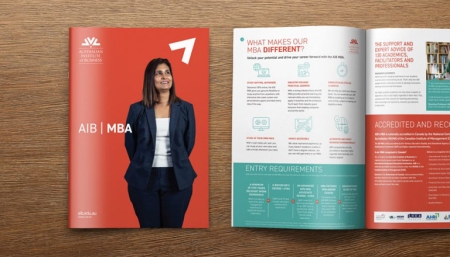How much does an MBA cost in Australia?

With over 21,300 students currently enrolled across Australia, more and more people are turning to MBAs to accelerate their careers and reach important professional milestones. After all, the figures don’t lie – 74% of our Fast-Track MBA alumni surveyed achieved their career progression goals while receiving a $33,000 pay increase.
But making the decision to apply for an MBA is a big one – you’ll need to consider how much time you have available to study, what your career objectives are and – most importantly – how much money you’re willing to invest.
So how much does an MBA cost in Australia? Read on to discover the MBA cost in Australia.
How much does an MBA cost in Australia?
At AIB, we believe that paying for your studies shouldn’t hold you back from achieving your goals. We are committed to keeping education affordable, so you can pay back your course fees and see a return on your investment faster.
While other online MBAs in Australia charge up to $50,000-$100,000, AIB offers one of the most affordable MBAs in the country. So how does AIB offer such an affordable program?
As an online MBA provider, we don’t have the expense of maintaining campuses and lecture theatres. This means that you won’t pay for things you don’t need. Instead, we ensure your MBA fees are properly invested in quality education, academic teams, student support services and innovative technological advancements.
Request a call to discuss MBA pricing.
Can I apply for FEE-HELP?
Yes, AIB is an approved FEE-HELP provider. With our customised MBA FEE-HELP Calculator, you can determine how FEE-HELP might impact your finances – including your total fee debt, your weekly take-home pay and how long your repayments will last.
What is FEE-HELP?
FEE-HELP is an Australian Government loan scheme that assists eligible students to pay part or all of their tuition fees. In simple terms, you can study now and pay your course fees later.
Calculate your FEE-HELP repayments.
Will my employer cover my MBA cost in Australia?
Some employers, especially large corporations, can assume part or the entire cost of your MBA. Why? Because having more MBA graduates in their business is beneficial for many reasons. For example, MBA graduates:
- Often have a variety of talents other employees don’t – such as communication, risk management, critical thinking and networking skills.
- Are much more likely to stay in their positions longer than those who don’t have an MBA.
- Attract new or higher-quality clients.
- Know how to assess and implement CSR strategies and policies to help their company positively impact the world.
Read: How hiring an MBA graduate can boost your company’s ROI.
Tips on getting your employer to fund your MBA
Do your research
Start by doing your homework. Your employer may already support some kind of professional development – whether through a formal training policy or on a case-by-case basis.
Speak to HR and find out what practices your company already has in place. If there’s no formal support, you can always talk to the finance team to see if there’s any wriggle room or tax deductions you can qualify for.
Be prepared for objections
Your manager may have some concerns about funding your MBA, so be prepared to alleviate them.
Let them know that you’ve spoken to the finance team, that the course may be tax-deductible, and that there are several payment options to sponsor some or all of your MBA.
If all else fails, don’t give up. If your MBA is job-relevant, speak to your own accountant to determine if an MBA will qualify as a personal income tax deduction.
Delivered online with continual updates, innovations and new releases, the Fast-Track MBA offers genuine flexibility, industry insights, practical skills and the support you need to achieve your goals in our fast-changing world. It’s created for people just like you.






